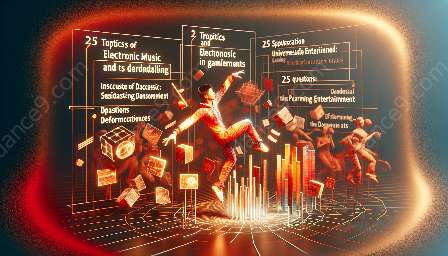Hosting electronic music and dance events is an exhilarating experience, but it also comes with various environmental considerations to take into account. From the energy consumption of sound systems to waste management and audience transportation, there are numerous ways in which these events can impact the environment. In this discussion, we will delve into the intersection of environmental sustainability with the key genres of dance and electronic music, exploring the impact of these events on the environment and strategies for responsible event management.
Key Genres of Dance & Electronic Music
Before diving into the environmental considerations, let's first explore the key genres of dance and electronic music. Electronic music, encompassing genres such as techno, house, trance, and drum and bass, is characterized by the use of electronic instruments and technology to create rhythmic and danceable sounds. These genres often serve as the driving force behind electronic music events, attracting a diverse and passionate audience.
Dance music, including subgenres such as disco, hip-hop, and EDM (Electronic Dance Music), is inherently linked to electronic music and is designed to inspire body movement and groove. These genres often form the core of dance events, where enthusiastic attendees gather to enjoy the beats and rhythms, creating an electrifying atmosphere.
Environmental Impact of Dance & Electronic Music Events
While electronic music and dance events offer an energetic and vibrant experience for attendees, they can also have a significant environmental impact. One of the primary considerations is the energy consumption associated with sound systems, lighting, and stage production. These events often require extensive power for amplification and visual effects, leading to a substantial carbon footprint if not managed efficiently.
Additionally, the influx of attendees and their transportation to and from event venues can contribute to air pollution and traffic congestion. The waste generated during these events, including single-use plastics, food packaging, and discarded promotional materials, can further strain the environment if proper waste management practices are not in place. Moreover, the potential impact on local wildlife and ecosystems due to noise pollution and habitat disruption cannot be overlooked.
Sustainability in Event Management
To address these environmental challenges, event organizers and stakeholders can adopt sustainable practices in event management. Implementing energy-efficient sound systems, utilizing LED lighting, and incorporating renewable energy sources can significantly reduce the carbon footprint of electronic music events. Furthermore, promoting public transportation, carpooling, and bike-sharing options for attendees can minimize the environmental impact of travel to and from the event.
Waste reduction and recycling initiatives, such as banning single-use plastics, implementing composting programs, and encouraging reusable and biodegradable materials, can help mitigate the waste generated during these events. Engaging with local environmental organizations and incorporating eco-friendly practices into event logistics can foster a sense of environmental stewardship among event participants and enhance the overall sustainability of the event.
Conclusion
As the popularity of electronic music and dance events continues to grow, it is crucial to consider their environmental implications and strive for responsible event management. By integrating sustainability into the planning and execution of these events, we can minimize their environmental footprint and create a positive impact on the planet. Through collaboration and innovation, the electronic music and dance community has the potential to set new standards for environmentally conscious event hosting, ensuring that the beat goes on while protecting our planet for future generations.






























